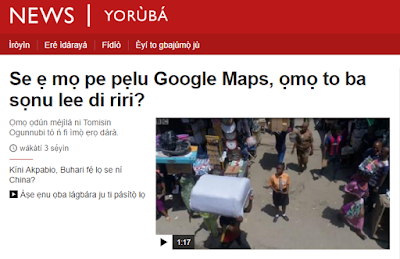Seven months after the British Broadcasting Corporation
launched Yoruba Language news service in addition to the Igbo language added in
2017, Infoprations has learnt that
the British Broadcasting Service Provider is not a threat to the survival of
local broadcast media but a challenge to innovate and ally with the
globalization.
According to Yoruba Presenters who exchanged views with Infoprations on Indigenous Language
segment of Broadcasting Industry in Nigeria, BBC has set an agenda which every
broadcast medium needs to key into towards rejuvenation of indigenous languages
and sustainable development as obtainable in China and other developing
countries that prioritised local languages.
“I
don't see BBC as a threat to indigenous languages in Nigeria. For example BBC
Hausa has been around since 1953 or thereabout I don't think it has taken away
the Hausa language. Also the medium which BBC is using here in South West can't
make it a threat to us. When we are talking about our indigenous language we
don't have it anymore in the urban it is in the rural areas you can get that,”
Temilade Aloko, a Yoruba Presenter in Ibadan noted.
To
Tayo Oyeladun, another indigenous language Presenter in Ibadan, BBC has proved
that local content is essential in broadcasting industry. “Very soon, many
international and national broadcast stations will follow the trend. This will
encourage many people to embrace indigenous languages more,” he stressed.
Temilade
Aloko added that Nigeria needs to have community radio stations to really
protect local languages. “I tell you if we have BBC Yoruba radio now people we
not believe any report on our local radio anymore. They will rely solely on
BBC. We should buckle up on indigenous language broadcasting by establishing
community radio stations. We only have commercial stations. Nobody is thinking
about community radio all we want to make is money not impact. Look at BBC
Hausa why do you think an average Hausa cannot do without radio, even in the desert;
he will listen to BBC Hausa.”
While launching the Yoruba Service in February 2018, BBC said
tailored contents will be disseminated to audiences who use mobile phones. However,
Infoprations’ Check reveals that the
station is better described as smartest and connected radio station in the country.
Since February, the station has been using integrated new media, combining
social networking sites with the separate news websites created for the Yoruba,
Hausa and Pidgin languages.
These insights align with the position of another presenter,
Olanrewaju Adewusi, who believes that the greatest challenge from the station’s
local language contents is the availability of sophisticated digital
technologies the station is applying for its contents dissemination to
Nigerians. “They might outrun the competency of
talents/employees in the local media outfits with the fact that the BBC, I
believe, has enough digital sophistication to do that,” he emphasized.


In my opinion I think opening an indigenous community radio station by BBC is long overdue and people will believe more in it than the private and public radio stations in the southvwest
ReplyDelete